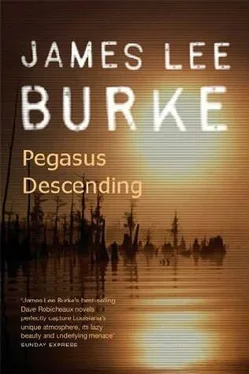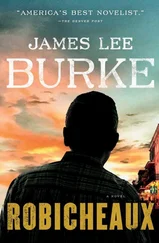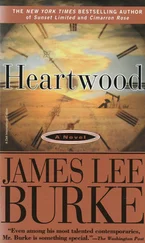“Walk with me to the back fence.”
The rear of the lot was strung with what is called a back-fence, one that is made up of steel spikes and smooth wire and is less attractive than a rail or slat fence but cheaper to construct and more utilitarian. On the other side was an ungrazed pasture, then a line of water oaks and pecan trees that separated the pasture from a sugarcane field. Mack pointed to a channel of dented grass in the pasture.
“My guess is somebody crossed the pasture on foot this morning, maybe somebody who parked his vehicle up there on the turnrow by the sugarcane field,” Mack said. “What do you think?”
I nodded without speaking.
“No, I mean who do you think would do this? Just between us.”
I rested my arm on a steel fence spike. I hated to even think about the possibilities that Mack’s question suggested. “I twisted the screws on Whitey Bruxal. Maybe Whitey thought Bello was about to roll over on him,” I said.
“The Mob uses pickaxes?”
“Whitey’s smart. He doesn’t follow patterns. That’s why he’s never done time.”
“I’m really bothered by this, Dave. Bello came to our church for help. I sent him over to the Holy Rollers. You ever figure out what was driving him?”
“Take your choice. Years ago he tried to lynch a black man. His wife thinks he attacked Yvonne Darbonne. He tried to revise his own life by controlling and destroying his son’s. Everything he touched turned to excrement.”
“He raped the Darbonne girl?”
“I just have the wife’s interpretation of events. She’s not an easy person to talk with. She says Bello raped Yvonne Darbonne the same day Darbonne shot herself.”
“Jesus Christ. Yvonne Darbonne was gangbanged that day.”
“That’s my point. I don’t know if Mrs. Lujan is telling the truth. I don’t believe she’s totally connected to reality.”
“Who is?” Mack said.
It was damp and cool inside the mist, and the pasture on the other side of the fence was emerald green, except for the trail of bruised grass that led from the wire back to the turnrow in the sugarcane. Across the road, Bello ’s house sat heavy and squat and white inside the mist, his flower gardens blooming, the bayou high and yellow in the background. He had owned everything a man could want. But his war with the world and his imaginary enemies had never ended. Was the serenity I had seen on his face in the horse stall simply the result of his nerve endings collapsing? Or in life had the aggressive leer of the moral imbecile been a form of pathological rictus that hid the frightened child?
“You already saw the tennis-shoe impressions in the stable?” Mack asked.
“Yeah, I need to talk to the black man who found Bello.”
“He’s up at the main house. Want me to see if I can get any latents off the fence?”
“Sure, go ahead,” I said, still unable to process my own thoughts about the life and death of Bello Lujan.
“I heard that crack Koko made. Don’t let him get to you, Dave. He’s full of rage over his kid getting killed in Iraq and doesn’t know who to blame for it.”
“I wasn’t thinking about Koko. I knew Bello before either one of us learned to speak English. He was a tough kid.”
“Yeah?” Mack said, waiting for me to go on.
“He was like most of my generation. The poor bastard believed everything people taught him.”
“Taught him what?”
“If he had money, he could forget he shined shoes down at the S.P. station. Bello never could understand that the kid with the shine box was probably the best person he would ever know.”
Mack put his empty pipe in his mouth and stared at the channel of broken grass in the pasture. He was trying to be polite, but it was no time for my lament on the problems of my generation and the lost innocence of a French-speaking culture that has become little more than a chimerical emanation of itself, packaged and sold to tourists.
“Dave, either we have a random killing, one done by a maniac who didn’t know the vic, or somebody who knew Bello’s daily routine and literally tried to eviscerate him. I hope to get you some prints off the pick handle, but-”
“But what?”
“I think the perp spent some time on this. I don’t think he threw down the weapon so we could find his prints all over it. I think the guy who did this is methodical and intelligent. Does that bring anyone to mind?”
“Yeah, Whitey Bruxal.”
“My thoughts shouldn’t stray too far past the lab, but when they kill like this-I mean, when they try to tear out somebody’s insides-the motivation is usually sexual or racial. Sometimes both.”
“What are you saying?”
“I’m not sure myself. Does Mrs. Lujan strike you as a charitable and forgiving spouse?”
“Thanks for your help, Mack. Give me a call from the lab, will you?”
“My pleasure,” he replied. “Hey, Dave, you going to talk to Yvonne Darbonne’s father? I mean, to exclude him?”
“Why?”
“No reason. He’s a good man. His daughter was the same age as one of mine. I don’t know if I could live with that kind of grief. I still have a hard time accepting the kinds of shit kids get into today. Drugs, abortion, hepatitis B, AIDS, herpes. They’re just kids, for God’s sakes. Before they’re twenty, they’re screwed up for life.”
You’re right again, Mack, I thought. But what was the solution? An authoritarian government? I feared how many people would answer in the affirmative.
I drove back onto the state road, then crossed a bridge over a coulee and parked in the turnrow by the sugarcane field where the killer probably entered the pasture on his way to Bello ’s stable. But the turnrow was churned with tractor, harvester, truck, and cane-wagon tracks, and littered with beer cans, snuff containers, and used rubbers as well, and I doubted that we would recover any helpful forensic evidence from the scene.
I watched the paramedics drive away with Bello ’s body, then I questioned the black man who had found Bello in the stall. The black man was not wearing tennis shoes and he did not believe any of Bello ’s other employees wore them, either. In fact, he said Bello insisted his employees wear sturdy work boots in order to prevent injuries and to keep his insurance premiums down. That sounded like classic Bello.
The black man also said he had never seen the pick before.
Then I rang the chimes on the front door of the Lujan home and was let inside by the maid.
I have either visited or investigated homicide scenes for over thirty-five years. Clete Purcel and I cut down a corpse that had been hanging in a warehouse for four months. We dug one dancing with maggots out of a wall. We scraped a twentieth-floor jumper off the steel stairs of a fire escape. We had to use tweezers to pick the remnants of one out of a compacted automobile. Twenty-five years ago I saw the interior of a house after rogue members of NOPD had put a hit on a whole family. Murder is an up-close and personal business, and rarely does a journalistic account do it justice. You want a capital sentence in a homicide prosecution? Make sure the jury gets the opportunity to study some color photographs before they go into deliberation.
But the worst part of any homicide investigation usually involves notification and questioning of family members. They want to know if their loved ones suffered, if they died in a brave or cowardly fashion, if the body was degraded. Often their eyes beg, but not for the truth. They want you to lie. And often that is exactly what you do.
Mrs. Lujan did not fall into the category I just described. In fact, when I was escorted by the maid onto the sunporch, I was stunned by what I saw. Mrs. Lujan was standing up with the aid of a walker, dressed in a pink skirt and white blouse, her face bright with purpose, her hair brushed and tied with a ribbon in back. She extended her hand and smiled wanly.
Читать дальше












